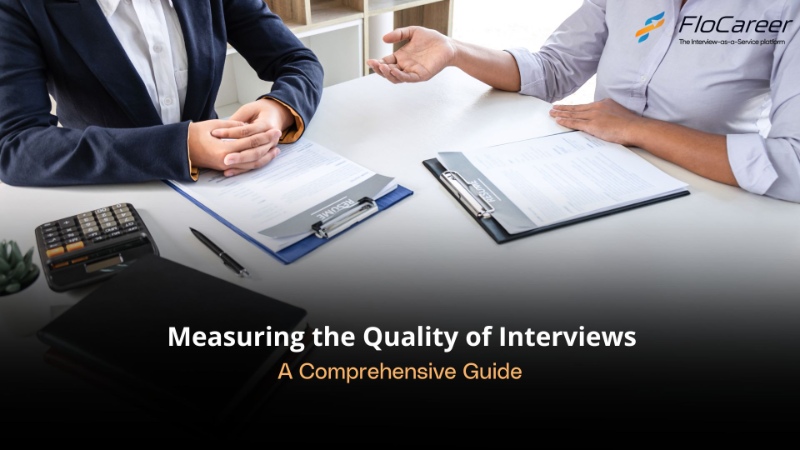Measuring the Quality of Interviews: A Comprehensive Guide
Interviews stand as the pivotal juncture in the recruitment process, wielding the power to shape the composition of your workforce and influence your organization's trajectory. Crafting a team of high caliber and diversity hinges on conducting interviews of impeccable quality.

Enhancing the standard of interviews poses a formidable challenge, yet organizations with subpar interview quality often find themselves making regrettable hiring decisions. Absent robust metrics, pertinent data, and evidential foundations for decision-making, companies may resort to evaluating candidates based solely on credentials, rendering them susceptible to various biases. In stark contrast, a meticulous measurement of interview quality equips organizations with the tools for discerning, informed hiring decisions.
LinkedIn's Future of Recruiting Report dubs the quality of the hiring process as the "holy grail" in assessing candidate performance. An overwhelming 88% of companies acknowledge the advantages of utilizing metrics to gauge interview quality, according to the same report.
In this discourse, we present 10 pragmatic methods for measuring interview quality, allowing organizations to enhance their processes by incorporating these strategies.
10 pragmatic methods for measuring interview quality,
1. Leverage Candidate Reviews
Solicit feedback from candidates regarding their interview experience. This includes insights into the questions posed and the interviewer's demeanor. These reviews serve as valuable resources for identifying areas of improvement and rectifying any shortcomings in subsequent interviews.
2. Incorporate Objective Data for Evaluation
Augment the interview process with objective data, such as standardized assessments or work samples. This holistic approach offers a comprehensive understanding of a candidate's capabilities and their alignment with the job requirements. Evaluating the interview's success is crucial for predicting a candidate's performance in the designated role.
3. Conduct Quality Hire Assessments
Gather specific evidence of a candidate's past performance through performance-based interviewing. This information serves as the basis for calculating a total score, quantifying the quality of the candidate hired based on interview performance. Post-hire quality assessments, including manager satisfaction surveys and employee engagement surveys, further refine the evaluation process.
4. Employ Interview Metrics
Utilize online metric analytics platforms to quantify interview data. Parameters such as speaking time, the number of questions asked, and follow-up question data offer insights into interview consistency and question precision. Establishing an Interview Quality Score based on these metrics promotes transparency and accountability throughout the organization.
5.Integrate Standardized Assessment Systems
Implement standardized assessment systems to evaluate interview quality. These systems provide a structured framework for scoring applicants objectively, reducing the likelihood of biased or subjective evaluations. Behavioral and situational inquiries that measure essential skills and talents contribute to a fair and objective evaluation process.
6. Implement Real-Time Feedback Mechanisms
Introduce a system for real-time feedback during the interview process. This can involve immediate input from interviewers, allowing them to assess their own performance and provide insights on the candidate. By incorporating feedback loops, organizations can promptly address any deviations from the intended interview standards.
7. Analyze Diversity in Interview Panels
Evaluate the diversity within interview panels to ensure varied perspectives. A homogeneous panel may inadvertently introduce biases. A diverse panel, comprising individuals with different backgrounds and experiences, can contribute to a more comprehensive and equitable evaluation of candidates, minimizing the risk of adverse impacts.
8. Track Interview-to-Hire Ratios
Monitor the correlation between the number of interviews conducted and the subsequent hiring outcomes. Excessively high or low interview-to-hire ratios may indicate inefficiencies in the screening process or missed opportunities to identify suitable candidates. Striking the right balance ensures a streamlined and effective recruitment process.
9. Foster Continuous Interviewer Training
Prioritize ongoing training for interviewers to refine their skills and stay updated on best practices. Continuous education can empower interviewers to recognize and mitigate biases, enhance communication techniques, and adapt to evolving organizational needs. Well-trained interviewers are essential for consistently high-quality interviews.
10. Leverage Technology for Interview Analytics
Embrace technology-driven solutions for comprehensive interview analytics. Automated tools can assist in analyzing interview data at scale, identifying patterns, and offering actionable insights. This data-driven approach enables organizations to make informed decisions about their interview processes, leading to continuous improvement and enhanced interview quality.
Flocareer is dedicated to elevating the quality of your interviews, thereby enhancing your hiring outcomes. Draw inspiration from these steps to refine your interview quality.
Evaluating interview quality is indispensable for achieving successful hiring outcomes. This involves scrutinizing structured questions, employing uniform scoring methods, and ensuring interviewer preparedness. By adopting these practices, companies can make informed hiring decisions. Structured questions relevant to the job, asked uniformly to all applicants, ensure a fair and objective evaluation. Behavioral and situational inquiries that assess vital skills contribute to a thorough evaluation. Standardized assessment systems play a pivotal role in objectively scoring applicants and mitigating hiring biases. Organizations should embrace these strategies to fortify their interview quality measurement processes and secure optimal hiring results.
Check out our latest blog on Adverse Impact of Recruitment ProcessAdverse Impact of Recruitment Process


